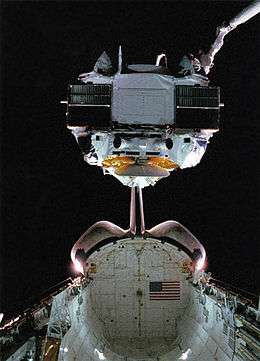1991 in spaceflight
For launches in the first half of the year, see 1991 in spaceflight (January–June), for launches in the second half, see 1991 in spaceflight (July–December).
This was the final year of the Soviet Union, and thus the end of the Cold War competition between the two space superpowers. The launch rate declined drastically from the initial three decades of the Space Age to the modern average of about eighty orbital launches per year worldwide.
|
The crew of STS-37 deploys the Compton Gamma Ray Observatory. | |
| Orbital launches | |
|---|---|
| First | 8 January |
| Last | 28 December |
| Total | 91 |
| Successes | 86 |
| Failures | 3 |
| Partial failures | 2 |
| National firsts | |
| Space traveller |
|
| Rockets | |
| Maiden flights |
Ariane 4 44P Atlas II |
| Retirements | Vostok-2M |
| Manned flights | |
| Orbital | 8 |
| Total travellers | 36 |
Deep Space Rendezvous in 1991
| Date (GMT) | Spacecraft | Event | Remarks |
|---|---|---|---|
| 29 October | Galileo | First flyby of asteroid - 951 Gaspra | Closest approach: 1,600 kilometres (990 mi) |
EVAs
| Start Date/Time | Duration | End Time | Spacecraft | Crew | Remarks |
|---|---|---|---|---|---|
| 7 January 17:03 |
5 hours 18 minutes |
22:21 | Mir EO-8 | Successfully repaired the damaged hatch on the Kvant-2 airlock and also positioned equipment for installation in a later EVA. | |
| 23 January 10:59 |
5 hours 33 minutes |
16:32 | Mir EO-8 Kvant-2 |
Installed the new Stela boom on the base block. | |
| 26 January 09:00 |
6 hours 20 minutes |
15:20 | Mir EO-8 Kvant-2 |
Installed supports on Kvant-1 to hold the solar arrays installed on Kristall. | |
| 7 April | 4 hours 26 minutes |
STS-37 Atlantis |
When the boom antenna on the GRO satellite would not extend, Ross and Apt exited the shuttle on an unplanned EVA to extend the boom to prepare for final release into orbit.[1] | ||
| 8 April | 5 hours 47 minutes |
STS-37 Atlantis |
Installed and tested several monorail-type mobility tools for future space station construction.[1] | ||
| 25 April 20:29 |
3 hours 34 minutes |
26 April 00:03 |
Mir EO-8 Kvant-2 |
Inspected and filmed the Kurs antenna on Kvant-1, finding that one of the antenna dishes was missing and then re-installed the camera on Kvant-2 that was removed and repaired. | |
| 24 June 21:11 |
4 hours 58 minutes |
25 June 02:09 |
Mir EO-9 Kvant-2 |
Replaced the damaged Kurs antenna on Kvant-1 and performed assembly tests on an experimental structural joint. | |
| 28 June 19:02 |
3 hours 24 minutes |
22:26 | Mir EO-9 Kvant-2 |
Attached TREK, a type of cosmic ray detector developed at the University of California, to the outside of Mir.[2] | |
| 15 July 11:45 |
5 hours 56 minutes |
17:41 | Mir EO-9 Kvant-2 |
Moved ladders and the base platform parts for the Sofora girder using the Strela boom from the airlock at Kvant-2 and installed them on Kvant-1. | |
| 19 July 11:10 |
5 hours 28 minutes |
16:38 | Mir EO-9 Kvant-2 |
Started construction of the Sofora girder by installing three of 20 structural pieces. | |
| 23 July 09:15 |
5 hours 42 minutes |
14:57 | Mir EO-9 Kvant-2 |
Continued the construction of the Sofora girder by installing eleven more of the 20 girder pieces. | |
| 27 July 08:44 |
6 hours 49 minutes |
15:33 | Mir EO-9 Kvant-2 |
Completed assembly of the Sofora girder and mounted a small Russian flag on top of the structure. Artsebarsky had trouble with fogging on his visor, due to overexertion, but Krikalyov was able to lead him back to the airlock. |
References
|
Generic references:
|
Footnotes
- 1 2 "Space Shuttle Flight 39 (STS-37)". Space Shuttle Video Library. National Space Society. 2008. Retrieved 27 February 2009.
- ↑ Price, P. B.; Lowder, D. M.; Westphal, A. J.; Wilkes, R. D.; Brennen, R. A.; Afanasyev, V. G.; Akimov, V. V.; Rodin, V. G.; Baryshnikov, G. K.; Gorshkov, L. A.; Shvets, N. I.; Tsigankov, O. S. (1992). "TREK: A cosmic-ray experiment on the Russian space station MIR". Astrophysics and Space Science. 197: 121. doi:10.1007/BF00645077.
| Timeline of spaceflight | ||||||||||
|---|---|---|---|---|---|---|---|---|---|---|
| 1940s | 1944 | 1945 | 1946 | 1947 | 1948 | 1949 | ||||
| 1950s | 1950 | 1951 | 1952 | 1953 | 1954 | 1955 | 1956 | 1957 | 1958 | 1959 |
| 1960s | 1960 | 1961 | 1962 | 1963 | 1964 | 1965 | 1966 | 1967 | 1968 | 1969 |
| 1970s | 1970 | 1971 | 1972 | 1973 | 1974 | 1975 | 1976 | 1977 | 1978 | 1979 |
| 1980s | 1980 | 1981 | 1982 | 1983 | 1984 | 1985 | 1986 | 1987 | 1988 | 1989 |
| 1990s | 1990 | 1991 | 1992 | 1993 | 1994 | 1995 | 1996 | 1997 | 1998 | 1999 |
| 2000s | 2000 | 2001 | 2002 | 2003 | 2004 | 2005 | 2006 | 2007 | 2008 | 2009 |
| 2010s | 2010 | 2011 | 2012 | 2013 | 2014 | 2015 | 2016 | 2017 | 2018 | 2019 |
This article is issued from Wikipedia - version of the 5/23/2016. The text is available under the Creative Commons Attribution/Share Alike but additional terms may apply for the media files.
